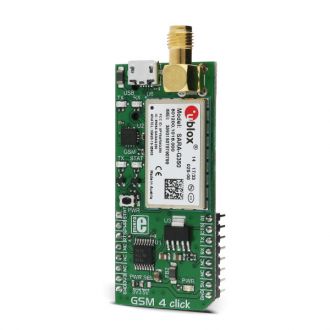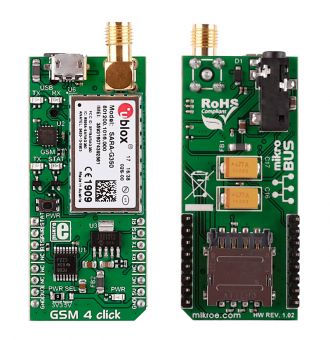
We strongly encourage users to use Package manager for sharing their code on Libstock website, because it boosts your efficiency and leaves the end user with no room for error. [more info]

Rating:
Author: MIKROE
Last Updated: 2018-01-21
Package Version: 1.0.0.1
mikroSDK Library: 1.0.0.0
Category: GSM/LTE
Downloaded: 9565 times
Not followed.
License: MIT license
GSM 4 click is a mikroBUS add-on board that features the U-Blox SARA-G3 series 2.5G GSM/GPRS cellular quad-band module. With the click you can send and receives calls, SMS, and data. It can also be used as a standalone device tied to a PC through the onboard USB port - no development environment is needed.
Do you want to subscribe in order to receive notifications regarding "GSM 4 click" changes.
Do you want to unsubscribe in order to stop receiving notifications regarding "GSM 4 click" changes.
Do you want to report abuse regarding "GSM 4 click".


Library Description
The library carries a generic command parser adopted for AT command based modules. Generic parser.
Key functions:
Examples Description
The example demo application waits for the call, and after the call is received the parser will get hang up.
This code snippet shows how a generic parser should be properly initialized. Before the intialization module must be turned on, and in addition to this the hardware
flow control should also be turner on.
Commands:
// MODULE POWER ON gsm4_hfcEnable( true ); gsm4_modulePower( true ); // MODULE INIT gsm4_cmdSingle( "AT" ); gsm4_cmdSingle( "ATE0" ); gsm4_cmdSingle( "AT+IFC=2,2" ); gsm4_cmdSingle( "AT+CMGF=1" );
Along with the demo application, timer initialization functions are provided. Note that the timer is configured according to the default development system and MCUs, changing the system or MCU may require an update of timer init and timer ISR functions.
Other mikroE Libraries used in the example:
Additional notes and information
Depending on the development board you are using, you may need USB UART click, USB UART 2 click or RS232 click to connect to your PC, for development systems with no UART to USB interface available on the board. The terminal available in all MikroElektronika compilers, or any other terminal application of your choice, can be used to read the message.